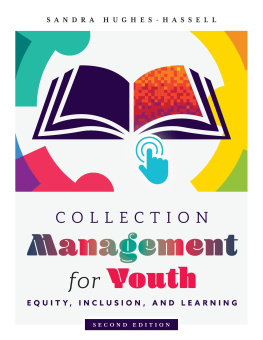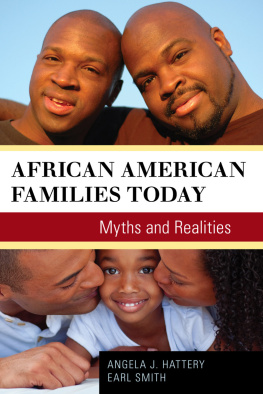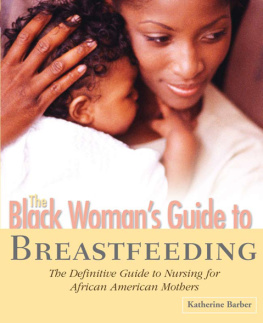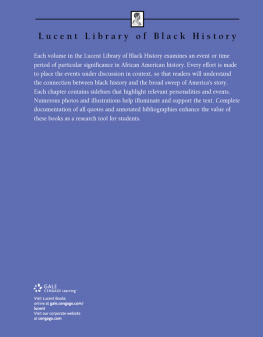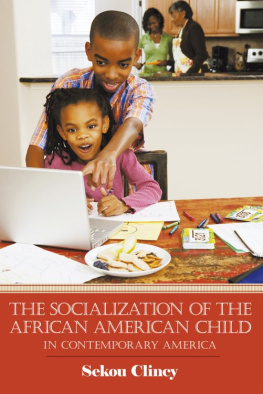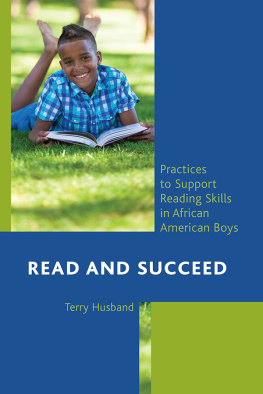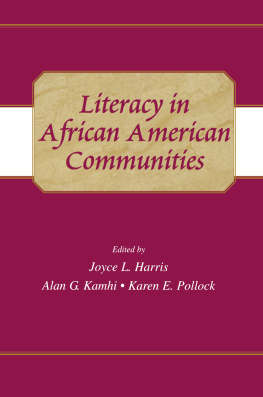LIBRARIES, LITERACY, AND AFRICAN AMERICAN YOUTH
Research and Practice
Sandra Hughes-Hassell, Pauletta Brown Bracy, and Casey H. Rawson, Editors

Copyright 2017 by ABC-CLIO, LLC
All rights reserved. No part of this publication may be reproduced, stored in a retrieval system, or transmitted, in any form or by any means, electronic, mechanical, photocopying, recording, or otherwise, except for the inclusion of brief quotations in a review, without prior permission in writing from the publisher.
Library of Congress Cataloging-in-Publication Data
Names: Hughes-Hassell, Sandra, editor. | Bracy, Pauletta Brown, editor. | Rawson, Casey H., editor.
Title: Libraries, literacy, and African American youth : research and practice / Sandra Hughes-Hassell, Pauletta Brown Bracy, and Casey H. Rawson, editors.
Description: Santa Barbara, CA : Libraries Unlimited, [2017] | Includes bibliographical references and index. | Description based on print version record and CIP data provided by publisher; resource not viewed.
Identifiers: LCCN 2016044071 (print) | LCCN 2016026929 (ebook) | ISBN 9781440838736 (E-book) | ISBN 9781440838729 (paperback : acid-free paper)
Subjects: LCSH: African Americans and libraries. | Libraries and communityUnited StatesCase studies. | Childrens librariesServices to minoritiesUnited StatesCase studies. | School librariesServices to minoritiesUnited StatesCase studies. | African American childrenBooks and reading. | African American teenagersBooks and reading. | African American childrenEducation. | African American teenagersEducation. | African American studentsSocial conditions. | LiteracySocial aspectsUnited States.
Classification: LCC Z711.9 (print) | LCC Z711.9 .L43 2017 (ebook) | DDC 027.6/308996073dc23
LC record available at https://lccn.loc.gov/2016044071
ISBN: 978-1-4408-3872-9
EISBN: 978-1-4408-3873-6
21 20 19 18 17 1 2 3 4 5
This book is also available as an eBook.
Libraries Unlimited
An Imprint of ABC-CLIO, LLC
ABC-CLIO, LLC
130 Cremona Drive, P.O. Box 1911
Santa Barbara, California 93116-1911
www.abc-clio.com
This book is printed on acid-free paper 
Manufactured in the United States of America
Contents
Sandra Hughes-Hassell and Casey H. Rawson
Pauletta Brown Bracy, Sandra Hughes-Hassell, and Casey H. Rawson
Pauletta Brown Bracy, Sandra Hughes-Hassell, and Casey H. Rawson
Sandra Hughes-Hassell
Sandra Hughes-Hassell, Casey H. Rawson, and Julie Stivers
Casey H. Rawson and Sandra Hughes-Hassell
Kirby McCurtis
Teresa Bunner
Theresa Ramos
Demetria Tucker and Sonya L. Scott
Sarah Alverson and Heather Cunningham
Anna Teeple
Faith Burns and Julie Stivers
Delia Neuman, Allen Grant, Vera Lee, and Mary Jean Tecce DeCarlo
Preface
one of the fundamental tasks of educators is to make sure that the future points the way to a more socially just world, a world in which critique and possibilityin conjunction with the values of reason, freedom, and equalityfunction to alter the grounds upon which life is lived.
Giroux (2010, para. 8)
Throughout our careers, each of us has explored how she can help improve the quality of literacy and life outcomes for African American youth. Our motivations for engaging in this work vary. Sandras involvement began early in her teaching career, when as a novice teacher, she realized that she was failing the Black second graders in her rural Virginia classroom. Her commitment intensified when, as the director of the Philadelphia Library Power project, she saw the unequal distribution of resources, lack of opportunity, and other forms of oppression and discrimination that negatively affected the lives of youth of color in the City of Brotherly Love. Pauletta began her professional career in a middle-school library media center in Pittsburgh, Pennsylvania, where she observed disparities in academic success among students enrolled in the ethnically balanced school. Motivated by these conditions, she has promoted the role of libraries in fostering literacy through culturally responsive pedagogy. Casey taught science in a high-poverty urban middle school that transitioned to one of the nations first single-gender public schools (a young womens academy) in her second year of teaching. In the course of that shift, her eyes were opened to the intersections of race, socioeconomic status, and gender in her students lives, as well as the multiple ways in which their opportunities were constrained by inequity.
Serendipitously, we found ourselves in the same area of North CarolinaPauletta at North Carolina Central University, and Sandra and Casey at the University of North Carolina at Chapel Hill (UNC-CH). The three of us formed a partnership based on our commitment to social justice and our conviction that libraries do change lives.
In June 2012, with funding from the Institute for Museum and Library Services (IMLS), we convened a group of public and school librarians, researchers, library administrators, policymakers, authors, publishers, and educators who, over the course of three days, focused on the question of how libraries might participate in and become leaders of national efforts to improve the quality of literacy education for African American male youth. At this summit, titled Building a Bridge to Literacy for African American Male Youth: A Call to Action for the Library Community, participants passionately explored three essential questions: (1) Why should libraries focus on the literacy needs of African American male youth? (2) What do we know about existing research, programs, and resources for these youth? and (3) What actions must the library community take? The summit resulted in a report (http://bridgetolit.web.unc.edu/?page_id=12) that presents the summit outcomes, the characteristics of effective library service for African American male youth, the fundamental knowledge needed by library and information science professionals, an expanded research agenda, and recommendations. A website (http://bridgetolit.web.unc.edu) was also created to support librarians in their efforts to meet the literacy needs of Black male youth. Since the summit, we have broadened the scope of our work to include African American female youth whose lives and life outcomes are also negatively affected by social inequities.
In this book, we explore how libraries can create more equitable and just services and programs for African American youthservices and programs that help to improve their literacy and life outcomes. Our goal is to introduce readers to key research concepts, such as Critical Race Theory (CRT), culturally relevant pedagogy, racial identity development, enabling texts, counterstories, and equity literacy; and to offer meaningful illustrations of how school and public librarians are using these concepts to effect real change in the lives of African American youth. We have selected powerful and inspiring concepts-in-practice examples to highlight in the second half of the book; however, the book is not intended to be a how-to-guide or a compilation of best practices. Instead, our intention is (1) to spur dialogue and reflection about how libraries must change to better meet the needs of African American youth, and (2) to motivate librarians to examine their beliefs, attitudes, and commitment to diversity, equity, and social justice. As Antero Garcia notes, best practices is a buzzword-driven form of highlighting a superior approach and ignores the cultural contexts in which teacher practices are developed (p. 9). We know that context drives practice.
Next page

